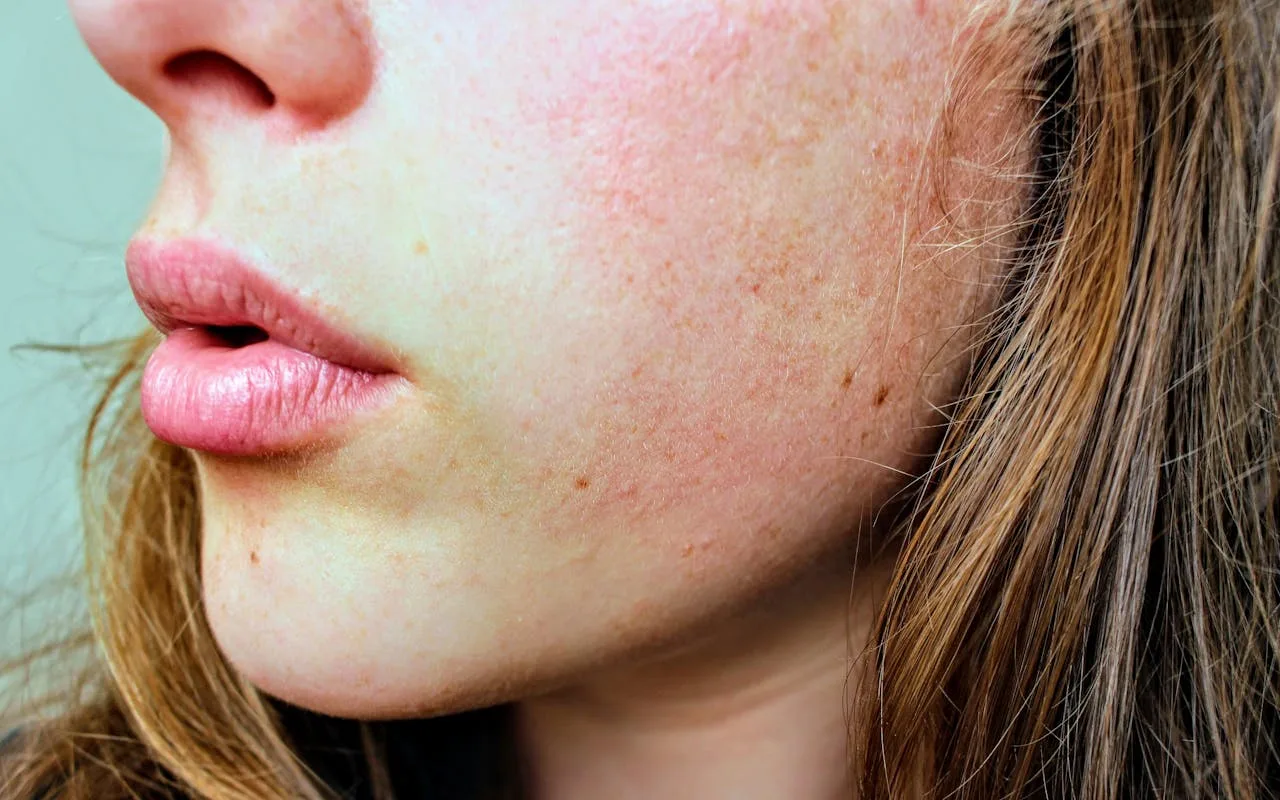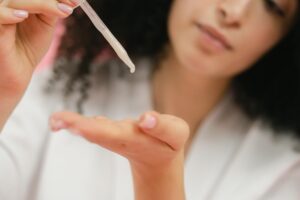In this article, I will be talking about everything you need to know about dry skin, its causes, which ingredients you should use, and which ones to avoid.
What is dry skin?
You know that tight, flaky feeling when your skin just won’t cooperate, no matter how much moisturizer you apply? That’s dry skin. It’s basically when your skin is not holding onto enough moisture so it ends up feeling rough, looking dull, and sometimes even cracking. A big giveaway that you have dry skin is when you wash your face, wait about 30 minutes without applying anything, and your skin starts to feel tight, dry, and maybe even flaky.
Causes of dry skin
- Cold weather
- Hot showers
- Harsh skincare products with alcohol or sulfates can dry out the skin
- Lack of moisture
- Dehydration
- Air conditioning and heaters
- Excessive exfoliation
- Skin conditions such as eczema or psoriasis (for this one you should see a dermatologist).
Genetics vs. Environment: What Causes Dry Skin?
Dry skin can be something you are born with or something that happens due to your environment and habits. Some people naturally have dry skin because their skin produces less oil due to genetics. But even if you don’t have inherently dry skin, factors like cold weather, hot showers, harsh skincare products, and dehydration can strip away moisture and make your skin feel dry and tight. And if you already have dry skin? These things just make it worse. So, whether you’re dealing with occasional dryness or it’s your skin’s default setting, knowing your skin type and how to treat it is the key.
Signs and symptoms of dry skin
- Tightness – feeling of tightness in your skin after cleansing your face
- Dry patches – small, dry flakes or patches may appear on your face
- Dullness – your skin looks dull and boring
- Itching – dry skin can sometimes feel itchy or irritated
- Cracks and rough texture – this in cases where severe dryness can cause small cracks or a sandpaper-like rough texture.
- Redness and sensitivity – dry skin can easily become red and more sensitive, especially after using harsh products.
- Fine lines and crepey skin – dryness can make fine lines more noticeable, giving the skin a crepey appearance.
Now that you know you have dry skin, it goes without saying that you should avoid environmental aggressors that can make the situation worse, like harsh weather, hot showers, and drying skincare products. But avoiding triggers alone isn’t enough, you also need to develop a skincare routine that balances what your skin is lacking. This means using hydrating ingredients, locking in moisture, and being consistent with your routine.
Meanwhile, it’s just as important to know which skincare ingredients to avoid, as some can strip away even more moisture and leave your skin feeling even drier. Knowing how to wash your face properly is a game-changer because the wrong technique can strip away every last drop of moisture and make you feel like a raisin.
Ingredients to look for in skin care products
If you have dry skin, you need ingredients that actually hydrate your skin, keep the moisture in, and fix that tight, flaky feeling.
Following are the ingredients that you should incorporate in your dry skincare routine.
1. Hyaluronic Acid – pulls water into your skin and there are products available in the market that are low molecular weight and are just as good at retaining water.
2. Glycerin – is a humectant, something that allows your skin to retain mositure, not only that but it is also an emoillent which means it will soften your skin as well. (Emollients are great for dry skin conditions like eczema and psoriasis).
3. Ceramides – our skin contains fatty acids known as ceramides. They are important to retain mositure in our skin. If our skin ceramide level decreases, our skin become dehydrated leading to dryness. Look for ceramides in your products especially ceramides 1, 3 and 6-II.
4. Squalane – lightweight oil that mimics your skin’s natural oils so it hydrates without feeling greasy.
5. Shea Butter – super rich and nourishing ingredient perfect for those with dry and flaky patches. Shea butter is an emollient meaning it will soften your skin.
6. Panthenol (Vitamin B5) – helps calm and heal dry, irritated skin.
7. Oat Extract – amazing for sensitive, dry skin. It helps with redness and irritation.
8. Fatty Acids (like Linoleic Acid & Omega-3) – found in oils like argan and rosehip, these help restore your skin’s moisture barrier.
9. Urea – Sounds scary, but urea actually has keratolytic properties which is great for getting rid of flaky dead skin while keeping moisture in.
Ingredients to avoid
If you have dry skin, some ingredients can make things worse by stripping away moisture or irritating your skin. You should avoid ingredients like
1. Alcohol – these are often found in toners and setting sprays and can suck the moisture right out of your skin.
2. Foaming Cleansers – Most of them contain sulfates or other harsh surfactants that strip your skin of its natural oils. So opt for a gel-based cleanser that doesn’t lather or has a mild lather.
3. Sulfates – such as sodium lauryl sulfates, they are harsh cleansing agents found in many famous cleansers.
4. Fragrances – they might smell nice, but they can be irritating and drying, especially if you have dry sensitive skin.
5. Salicylic acid and benzoyl peroxide – while they are great for oily, acne-prone skin, but too drying for already parched skin. People with dry skin can still get acne and blackheads and some do use salicylic acid (SA) and benzoyl peroxide (BP). The key is how you use them. These ingredients can definitely be drying for your skin, which is why they’re often recommended for oily skin. But if you have dry skin and acne, you don’t have to avoid them entirely, just use them strategically.
6. Witch Hazel – often used as a toner, but it can be too astringent and drying for dry skin types. While it has soothing benefits, many witch hazel products contain alcohol, which can strip moisture and make dry skin even drier. If you have dry or sensitive skin and still want to use it look for alcohol-free witch hazel combined with hydrating ingredients like glycerin or aloe vera.
7. Clay-Based products (Kaolin, Bentonite clay) – These absorb oil, which is great for oily skin but can make dry skin even drier.
8. Retinoids overuse(Retinol, Retin-A, Tretinoin) – Retinoids (Retinol, Retin-A, Tretinoin) – While good for anti-aging, they can sometimes be very drying. If you want to use them, go for a lower concentration and buffer with a good moisturizer. There are new formulations available on the market that use slow-release technology, and they are so gentle on the skin. And if those are still not for you, you can use a plant-based alternative such as bakuchiol.
9. Exfoliating acids in high concentrations (Glycolic Acid, Lactic Acid, AHAs, BHAs) – Over-exfoliating can weaken your skin barrier and make it even drier.
10. Charcoal-based products – Like clay, charcoal pulls out impurities but also absorbs moisture, which dry skin can’t afford to lose.
Skincare products can help but hydration starts from within. Simple daily habits like drinking enough water, getting proper sleep, and even trying detox water can make a big difference in keeping your skin from getting dry. If you want to dive deeper into natural ways to hydrate your skin, I’ve covered them in detail in my article on 10 Best Ways to Hydrate Your Skin.
Eczema vs. psoriasis
Sometimes, what seems like dry skin could actually be a skin condition like eczema or psoriasis. While dry skin is mainly caused by lack of moisture, eczema is an inflammatory condition that can cause redness, itching, and flare-ups. Psoriasis, on the other hand, leads to thick, scaly patches due to rapid skin cell turnover. If your skin stays irritated no matter how much you hydrate it, you should check with a dermatologist to rule out these conditions.
Maleeka is an orthodontic resident with a passion for skincare and beauty. She decodes beauty products, breaks down ingredients, and spills the tea on marketing hypes. When she’s not perfecting smiles or geeking out over the latest formulations and trends, you’ll find her binge-watching Netflix.





Pingback: How Peace Out Acne Dots Earned A Permanent Spot In My Skincare Stash
Pingback: La Roche Posay Cicaplast Balm B5 To The Rescue For My Freaked-Out Skin Barrier
Pingback: I Had A Damaged Skin Barrier & Here’s How The Ordinary Moisturizer Helped
Pingback: What Does Body Oil Do For Your Skin & Do You Really Need One?
Pingback: How To Use Lactic Acid In Your Skincare Routine
Pingback: The Complete Guide To Oily Skin: Causes, Myths, And Skincare Tips
Pingback: This Sol De Janeiro Brazilian Bum Bum Cream Review Tells If It’s Really Worth The Hype
Pingback: Can You Use Salicylic Acid With Retinol?
Pingback: How To Wash Your Face Properly For A Deep Cleanse
Pingback: 8 Best Fungal Acne Safe Moisturizers
Pingback: Biodance Bio Collagen Deep Mask Is TikTok’s Favorite “Second Skin” – But Does It Actually Work?
Pingback: The Best Cleanser For Sensitive Skin To Gently Remove Dirt Without Causing Irritation